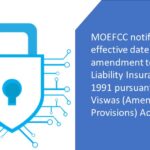We have already reported that the Human Immuno-Deficiency Virus and Acquired Immune Deficiency Syndrome (Prevention and Control) Act, 2017 (“Act”) is effective since 10th September 2018.
This is a quick update to let you know that the Central Government has recently notified the Human Immunodeficiency Virus and Acquired Immune Deficiency Syndrome (Prevention And Control) Rules, 2018 (“Rules”) effective 17th September, 2018.
Key Highlights:
- The model Policy applicable to an establishment, engaged in the provision of healthcare services and every other establishment where there is a significant risk of occupational exposure to HIV must provide for a safe working environment and for informed consent for testing, treatment and research in accordance with the provisions of the Act. [The Rules have defined the Appropriate Authority as: The National AIDS Control Organization in case of Central Government; and The State AIDS Control Society in case of State Government. The Appropriate Authority under the Central Government is expected to notify a model HIV and AIDS Policy for establishments. The model HIV and AIDS Policy (“Policy”) once notified must be adopted by every establishment. [P.S Please be informed that these guidelines are yet to be notified by the Appropriate Authority].
- The model Policy applicable to an establishment having 100 or more employees and 20 or more employees in case of a health care provider, must provide a redressal mechanism in accordance with the Act and the Rules.
- The person in charge of or responsible to the establishment must:
- communicate the text of the Policy to all its employees;
- prominently post the text of the Policy as a notice in English and in the language understood by majority of persons working in or accessing such establishment on special boards to be maintained for such purpose, at or near the entrance through which the majority of the persons working in or accessing the services of the establishment enter such establishment. (This Notice must state the manner in which copies of the Policy can be obtained and that the persons working in or accessing the services of the establishment are entitled to a copy of such policy free of charge).
4. Establishments must conduct annual training sessions for employees for understanding and implementing the Policy.
5. The copies of the Policy of establishments must be made available in the public domain by those to whom the Policy has been made available including on their website, if any and in case of hard copies for a nominal price.
6. Every establishment having 100 or more employees and 20 or more employees in case of a health care provider, must:
- designate a person of senior rank as their Complaints Officer within 180 days of commencement of the Act, i.e., March 9, 2019. Such designated person will dispose of complaints of violations of the provisions of the Act in the establishment, in accordance with these rules.
In case of every branch of an establishment having 100 or more employees and 20 or more employees in case of a health care provider, must:
- designate a person of senior rank as their Complaints Officer within 180 days of commencement of the Act, i.e., March 9, 2019. Such designated person will dispose of complaints of violations of the provisions of the Act in the establishment, in accordance with these rules.
7. The establishments must provide training to the Complaints Officer within 30 days of his/her designation.
8. Establishments must within a period of thirty days of appointing the Complaints Officer,
- Establish a method for receipt of complaints in electronic form either through dedicated website, webpage or by providing an official email address for the submission of complaints to the Complaints Officer.
9. The Complaints Officer must maintain a register and record all the complaints sequentially mentioning the time of the complaint and the action taken on the same. The complaints Officer must provide an acknowledgement to the complainant upon receipt of a complaint.
10. The Complaints Officer must act in an objective and independent manner while deciding complaints made under the Act and decide a complaint promptly and in any case within 7 working days. (Note: The Complaints Officer must decide the complaint on the same day on which he receives the complaint, in case of emergency or in the case of healthcare establishment where the complaint relates to discrimination in the provision of, or access to health care services or provision of universal precautions).
11. The Complaints Officer must be non-biased and act as an independent and objective manner.
12. The Complaints Officer must on violation of the Act in the complaint:
- First, direct the establishment to take appropriate measures to rectify the violation
- Counsel, the offender and provide training in relation to HIV and AIDS Act, guidelines and rules for a period of one week
- Fix a period of social service for the offender, which includes working with a NGO working on HIV AIDS or under appropriate authority under State government, that should be monitored.
- It is required that the person supervising the violator also goes through the training
13. The establishment must furnish the number of complaints, nature of complaints to the central authority or on the website of the establishment:
- Annually under section 11 and rule 13.
- Every six months to the central authority under section 11.
14.The Complaints officer must comply with data protection measures under the Act and Rules. The officer must ensure protection of the identity of the protected person.
15. Every establishment which requires to appoint a Complaints Officer must-
a)organize workshops and awareness programs for sensitizing its employees with the provisions of the Act and orientation programs for the Complaints Officer, on an annual basis;
b)provide necessary facilities to the Complaints Officer for deciding the complaint and make the required information available which helps the officer in deciding regarding the complaint.
Source: The Ministry of Health and Family Welfare




